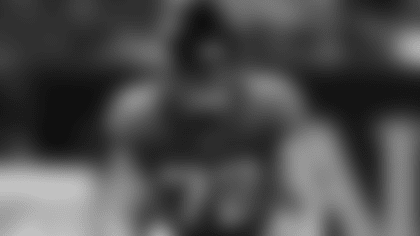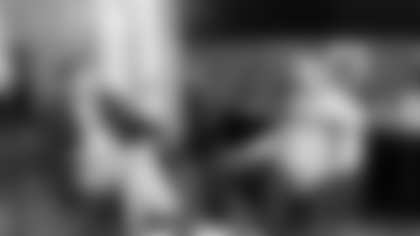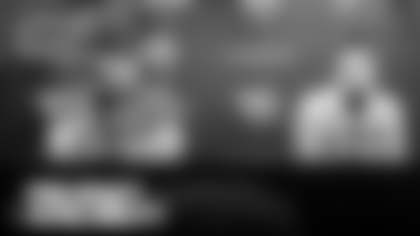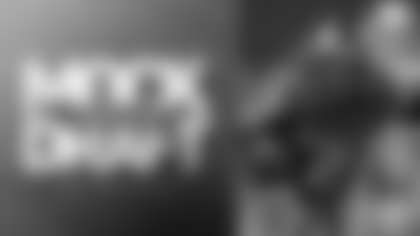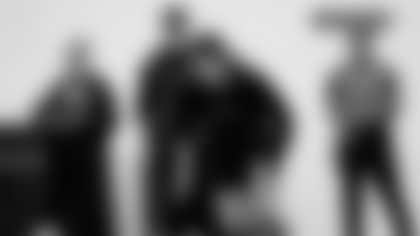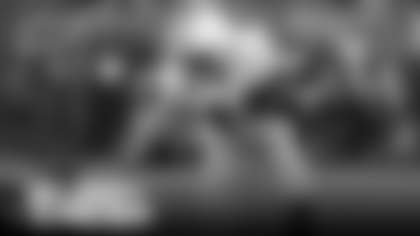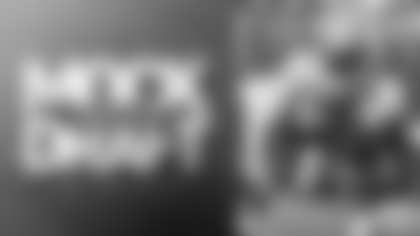JACKSONVILLE – Walker Little looks like the answer to a question the Jaguars have been asking since 2001: Who can replace Pride of the Jaguars honoree Tony Boselli at left tackle? There have been plenty of players at the position for the Jaguars who here highly regarded and highly drafted: Mike Pearson from Florida, Khalif Barnes from Washington, Eugene Monroe from Virginia and Luke Joeckel from Texas A&M. All were thought to be suitable successors to one of the game's best ever at his position. None were, but there is a possibility Walker might finally be the guy for whom they have been searching. Those expectations may seem too lofty for a rookie offensive tackle, but Little has the look of an elite talent at one of the game's most critical positions and he has dealt with high expectations since his days at the Episcopal School outside Houston – where he was a consensus All-American, a five-star prospect and judged by many to be the No. 1 prospect in his recruiting class. Walker's 6-feet-7, 320-pound frame is physically up to the challenge – as is his intellect, built and sharpened at one of America's finest academic institutions. He's ready to play – at least, he believes he will be when his number is called. That's saying a lot considering he hadn't been on a field in a competitive posture since an early season game against Northwestern in 2019. Here's senior correspondent Brian Sexton's recent conversation with Little:
Question: What has it been like getting back on the football field after almost two years away from the game?
Answer: It means a lot. I obviously haven't taken that much time off from any sport – and definitely not football. I've been playing tackle football since the third grade, so to have that amount of time off both because of injury and COVID[-19] was really weird. It was weird watching football all the time and not actually doing it myself. Not being at practice and not being around a team is really what I missed most. Being drafted, especially getting drafted by a team like this organization, has been such a blessing – and above all else it's a blessing to get back on the field and start practicing and playing and building relationships like you do on a team.
Q: Was it like riding a bicycle? Did you just get on and start pedaling again?
A:For me, yeah, it is. I kind of was a little nervous going into rookie minicamp and OTAs because I hadn't done it in a while, but as soon as the ball was snapped it was just playing football again. I started walking off the field and I didn't feel like I missed a beat and so I felt like it was an easy transition, and I was glad to be able to make it.
Q: There are a lot of eyes on you, a lot of expectations for the player you're supposed to become for the Jaguars. How do you deal with that kind of attention? Especially considering you have been on the sidelines for most of the last two seasons?
A:Ever since I was in high school I was billed as a big-time recruit and the expectation since I was 17 years old was that I was going to become an NFL left tackle or an NFL offensive lineman and so I've been told that my entire life. When you're a little kid and you're told that you're like, "What the heck?" It seemed so far away but then I got to Stanford and there were so many expectations and there always is and I think they're good. It's good to have that kind of pressure. It's good to have that pressure on yourself because it forces you to have big expectations for yourself and I'm always going to have higher expectations than anyone else has for me. I've always liked it and been able to deal with it fine, it's never been too big of a deal for me.
Q:Do you feel better prepared to come in and play because you played at Stanford for Head Coach David Shaw, who has not only a strong Pac-12 program but a system that is as close to an NFL scheme as you see in college football?
A:Coming from Stanford it wasn't too crazy of a transition because we ran a pro-style offense and they put a lot on us there. They tried to make it as close to playing in the NFL as they could, but there is definitely a jump up in what we are doing and what we want to get done against certain fronts and it's only a few degrees off from what we did at Stanford. It's a blessing to come from a school like Stanford and have a jump start on things because the way we played and called things were pretty similar to how we do things with the Jaguars.
Q:Offensive line coach George Warhop told the media last week that no matter how highly regarded a college offensive lineman is, the move to the NFL requires time and patience. Have you seen this to be true in your short time with the Jaguars?
A:As a player, all that matters is what you do when you're out on the field and you're judged by games and the film and that's preseason and regular-season games. I definitely think that's true and there are a lot of things that I saw that I can learn from and build upon and that's why you play those games. It was awesome to get as much playing time as I did as a rookie. My expectation, my plan, is to work hard and get in the playbook and be ready when they send me into the game. But it's definitely a big step up.
Q:You played for a great college coach at Stanford. You probably knew about Urban Meyer when he was at Florida and Ohio State winning championships. What has the transition from Shaw to Meyer from Stanford to the Jaguars been like for you thus far?
A:It's been pretty awesome to come into this organization and to get to be around Coach Meyer, who has been one of the most successful college football coaches in the game and has turned around a lot of programs really quickly and he's working on the same thing here. Everything that he preaches to us, some of that I've heard before at Stanford, but plenty of it has been new and a lot of it is about mindset – the mindset we want to have each and every day at practice and on game days and just how he approaches each and everything. Whether it's a lift or meetings or practice or recovery, he talks about having a lot of intent about what you do and how you do it. Everything he does is about changing this culture and ultimately it's a great culture that's going to drive this organization, so having a strong culture with some really good leaders is going to help every player – and especially young players like me – improve faster and help us get where we want to go faster, which is to win a lot of games. Which is what we all want, and the city of Jacksonville deserves.
Q:You played in the Pac-12, so you had to have an idea of who Tony Boselli is and how he played the game. It looks like you like to play with an edge, a nasty edge like he did. Am I on to something here?
A:People have said that forever. A huge part of football is being able to balance being a normal person off the field and flip that switch when you are out there on it. I credit my brother for a lot of that because we were always fighting and competing growing up and I had to learn to stand up for myself and get a little bit of mean streak at a young age. It's a big part of the game and I think being an offensive lineman it better be a big part of your game because it's hard to really be good if you don't want to win every single snap. Being a Texans fans growing up in Houston, I knew who he was and that he was a part of those early Jaguars teams that were so good – and also being at Stanford I knew about his time at USC. He was an amazing left tackle and a person who has done a lot for this organization so he's someone I am trying to model myself after. It would be a blessing if I could ever get close to where he was at in his prime. He's someone I strive to be like.



